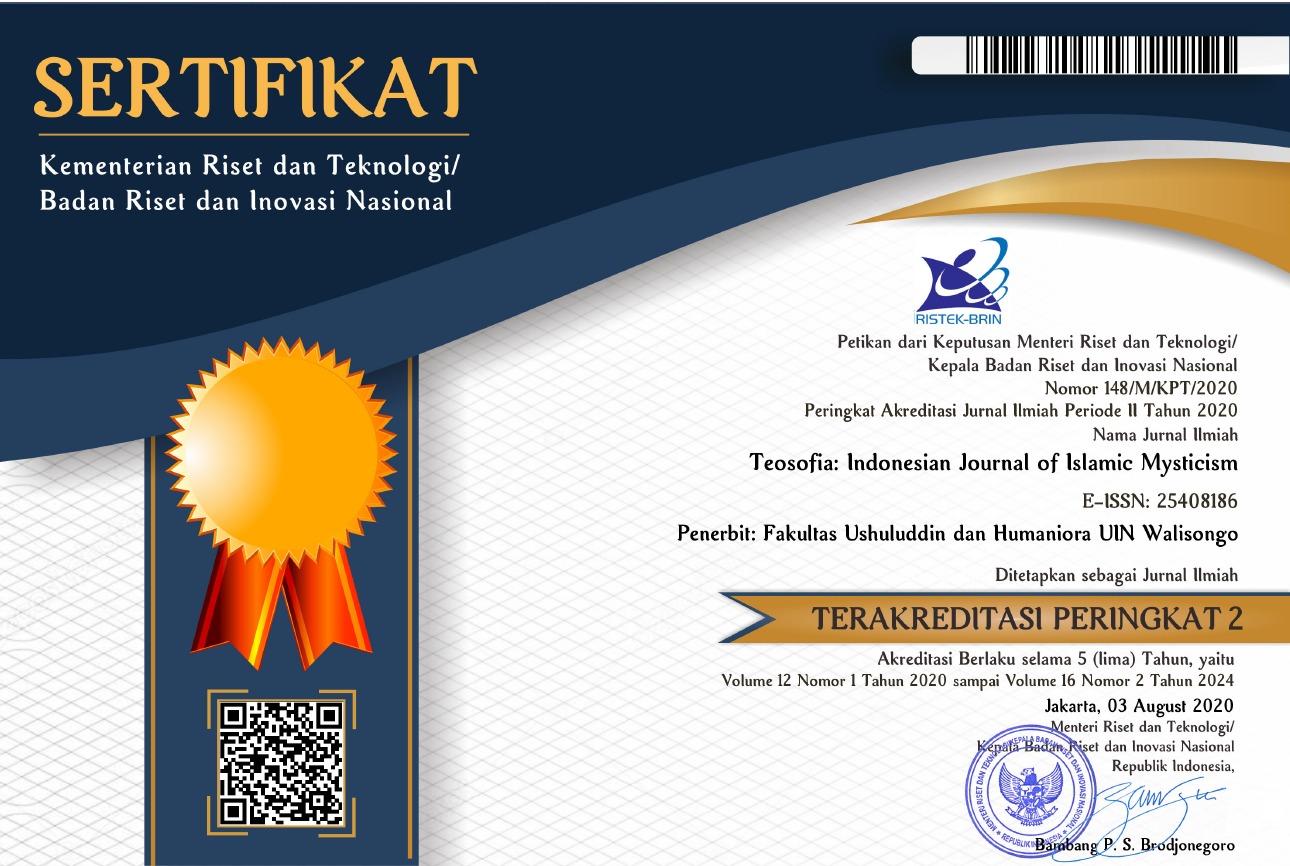God in Awe and Intimacy: Jewish and Muslim Perspectives on Understanding and Pronouncing the Name(s) of God and its Relation to the Humanitarian Crisis
DOI:
https://doi.org/10.21580/tos.v13i1.20534Keywords:
Jews, Muslim, Divine Names, humanitarian crisisAbstract
The concept of God is essential for both Jews and Muslims. Instead of using the terms Judaism and Islam, this study considers the terms Jews/Jewish and Muslims as more proper to focus on human beings as the subject of religion who are open to dialogue and change. Loving God’s creations is a process of loving the Creator. Thus, this study tries to connect Jewish and Muslim understanding and belief in God’s Names and its implications for their actions concerning the humanitarian crisis, especially today’s Israel-Palestine relationship. This study applies the content and comparative analysis of the texts (documents, videos, and pictures) related to the issue, along with the teachings of Isaac Luria and Mulla Sadra. In addition, a phenomenological approach is also used as it leads to an effort to understand religious thought and behavior from the point of view of the religious person. This study revealed that how humans understand Divine Names is manifested in how they treat each other. As human beings are the best manifestation of God, how we see, treat, and interact with others reflects our understanding of God’s names and vice versa. God’s names are all beautiful. Therefore, those who believe in God will do good to themselves, others, and the universe.
Contribution: This study provides insight into a correlation between one’s beliefs and actions among Jews and Muslims. One’s actions reflect one’s understanding of God and vice versa. Also, how we can try to stay physically, mentally and spiritually strong amidst the happening conflicts and chaos through the reflection on the topic.
Downloads
References
Ahmed, Jashim Uddin. “Documentary Research Method: New Dimensions.” Indus Journal of Management & Social Science (IJMSS) 4, no. 1 (2010): 1–14. https://ideas.repec.org/a/iih/journl/v4y2010i1p1-14.html.
Bekkum, Wout Jac. Van. “What’s in the Divine Name? Exodus 3 in Biblical and Rabbinic Tradition.” In The Revelation of the Name YHWH to Moses: Perspectives from Judaism, the Pagan Graeco-Roman World, and Early Christianity, edited by George H. Van Kooten. Leiden: Brill, 2006.
Ben-Sasson, Hillel. “Representation and Presence: Divine Names in Judaism and Islam.” Harvard Theological Review 114, no. 2 (April 20, 2021): 219–40. https://doi.org/10.1017/S0017816021000158.
Bliss, Linda A. “Phenomenological Research: Inquiry to Understand the Meanings of People’s Experiences.” International Journal of Adult Vocational Education and Technology 7, no. 3 (2016): 14–26. https://doi.org/10.4018/IJAVET.201607010.
Byrne, Máire. The Names of God in Judaism, Christianity, and Islam: A Basis for Interfaith Dialogue. New York: Continuum International Publishing Group, 2011.
Dubov, Nissan Dovid. “The Arizal.” Accessed March 3, 2024. https://www.chabad.org/library/article_cdo/aid/361878/jewish/The-Arizal.htm.
Flexner, Stuart Berg, and Leonore Crary Hauck, eds. The Random House Dictionary of the English Language. New York: Random House Inc., 1987.
Gaon, Saadya. The Book of Doctrines and Beliefs. Indianapolis: Hackett Publishing Company, 2002.
Haslam, Nick, and Michelle Stratemeyer. “Recent Research on Dehumanization.” Current Opinion in Psychology 11 (October 2016): 25–29. https://doi.org/10.1016/j.copsyc.2016.03.009.
Hassan, Muhammad. “Documentary Research – Types, Methods and Examples.” https://researchmethod.net/documentary-research/, 2024.
“Isaac Luria.” Accessed March 3, 2024. https://www.newworldencyclopedia.org/entry/Isaac_Luria.
Karantzas, Gery C., Jeffry A. Simpson, and Nick Haslam. “Dehumanization: Beyond the Intergroup to the Interpersonal.” Current Directions in Psychological Science 32, no. 6 (December 30, 2023): 501–7. https://doi.org/10.1177/09637214231204196.
Levy, Gideon. ...“...About Israel.” https://www.youtube.com/@videoarhiv23, 2023. https://www.youtube.com/watch?v=Fn0GVnEVCNE.
———. “What I Would Tell a Visiting Congressional Delegation.” In Israel’s Influence: Good or Bad for America? Washington DC, 2016. https://www.israelsinfluence.org/transcripts/gideon_levy.html.
Miles, Matthew B., A. Michael Huberman, and Johnny Saldaña. Qualitative Data Analysis: A Methods Sourcebook (3rd Edition). USA: SAGE Publications, 2014.
Morris, William, ed. The American Heritage Dictionary of the English Language. New York: American Heritage Publishing Co., Inc., 1969.
Rayan, Samuel. “Naming the Unnamable.” In Naming God, edited by Robert P. Scharlemann. New York: Paragon House Publishers, 1985.
Rizvi, Sayed S. Akhtar. God of Islam. New York: Tahrike Tarsile Qur’an, Inc., 1994.
Robinson, George. “Isaac Luria and Kabbalah in Safed.” Accessed March 3, 2024. https://www.myjewishlearning.com/article/isaac-luria-kabbalah-in-safed/.
Scatolon, Andrea, Keren Sharvit, Carmen Huici, Alba Alamo Hernandez, Gilat Glazer, Elena Lorenzo Sánchez, and Melanie Michna. “Focusing on the Self to Humanize Others: The Role of Empathy and Morality.” Current Opinion in Behavioral Sciences 51 (June 2023): 101264. https://doi.org/10.1016/j.cobeha.2023.101264.
Scholem, Gershom. “Issac Luria: A Central Figure in Jewish Mysticism.” Bulletin of the American Academy of Arts and Sciences 29, no. 8 (May 1976): 8–13. https://doi.org/10.2307/3823938.
Schorsch, Ismar. “Behind God’s Names,” 1993. https://www.jtsa.edu/torah/behind-gods-names/.
Simon, Jeremy C, and Jennifer N Gutsell. “Recognizing Humanity: Dehumanization Predicts Neural Mirroring and Empathic Accuracy in Face-to-Face Interactions.” Social Cognitive and Affective Neuroscience 16, no. 5 (May 4, 2021): 463–73. https://doi.org/10.1093/scan/nsab014.
Stanford Encyclopedia of Philosophy. “Mulla Sadra,” 2009. https://plato.stanford.edu/entries/mulla-sadra/.
Sultanah, Shameem. “What’s the Meaning of SubhanAllah?” instagram, 2023. https://www.instagram.com/p/C1KIGh_hCyF/?img_index=1.
“The Name of God.” Accessed March 2, 2024. https://mechon-mamre.org/jewfaq/name.htm.
The William Davidson Talmud. “Avodah Zarah 18a.” Accessed December 12, 2019. https://www.sefaria.org/Avodah_Zarah.18a?lang=bi.
Downloads
Published
How to Cite
Issue
Section
License
Copyright
The copyright of the received article shall be assigned to the journal as the publisher of the journal. The intended copyright includes the right to publish the article in various forms (including reprints). The journal maintains the publishing rights to the published articles. Therefore, the author must submit a statement of the Copyright Transfer Agreement.*)
Licensing

This work is licensed under a Creative Commons Attribution-ShareAlike 4.0 International License.
In line with the license, authors are allowed to share and adapt the material. In addition, the material must be given appropriate credit, provided with a link to the license, and indicated if changes were made. If authors remix, transform or build upon the material, authors must distribute their contributions under the same license as the original.
_______
*) Authors whose articles are accepted for publication will receive confirmation via email and send a Copyright Transfer Agreement.








